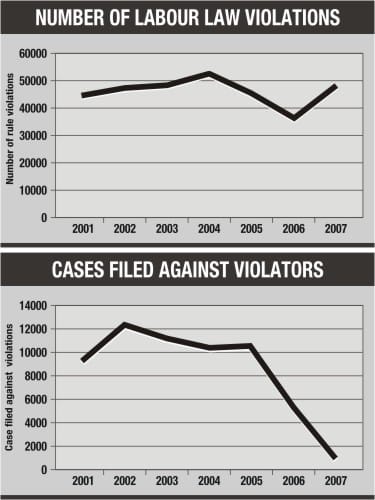Fewer factories sued despite rise in labour law violations

The number of cases filed against factories for violating labour laws plummeted last year despite an increase in the number of violators detected by government inspectors.
The Directorate of the Chief Inspector of Factories and Establishments (CIFE) is charged with detecting and suing violators but the number of cases it filed in 2007 slumped to just 428 compared to 5684 in the previous year.
At the same time the number of violations detected by factory inspectors actually increased to 48291, compared to 37033.
The CIFE blamed new routines introduced in 2006 that mean inspectors now have to file cases in person at one of a very limited number of labour courts. Previously they could file cases by post.
Among other things CIFE inspectors monitor work places to ensure the minimum wage boards are enforced, and that workers are not subject to irregular payments, irregularities in maternity leave, overtime and other allowances. They also check the working atmosphere, workers' physical safety and security and child labour issues.
Between 2001 and 2005 the number of cases filed averaged more than 9,000.
Jamshed Rahman, the CIFE in-charge, pointed out that as per the present rule, the inspectors concerned are required to remain present in person in the court at the time of filing case against any violation of rules, whereas in the past it was possible to file such a case through a postal registration.
"Inspectors could file cases in the magistrate's courts across the country but now they can do so at the four labour courts in the divisional headquartersDhaka, Chittagong, Rajshahi and Khulna," Rahman added.
When asked about merits of such cases, Rahman remarked that continuous inspection of factories, filing cases and punitive measures against the violators would help change the owners' mindset to comply with labour laws.
"Although penalties seem very marginal ones, but it is an effective tool to implement labour laws," Rafiqul Islam Nanna, a member of the National Minimum Wage Board, said, suggesting a continuous CIFE vigilance.
Abdus Salam Murshedy, a director of Bangladesh Garment Manufactures and Exporters Association (BGMEA) pointed to the fact that none of the busy garment factory owners want to take the trouble of being engaged in a lengthy proceeding of labour courts. He termed such lengthy proceeding 'itself a penalty for rule violators.'

 For all latest news, follow The Daily Star's Google News channel.
For all latest news, follow The Daily Star's Google News channel. 



Comments